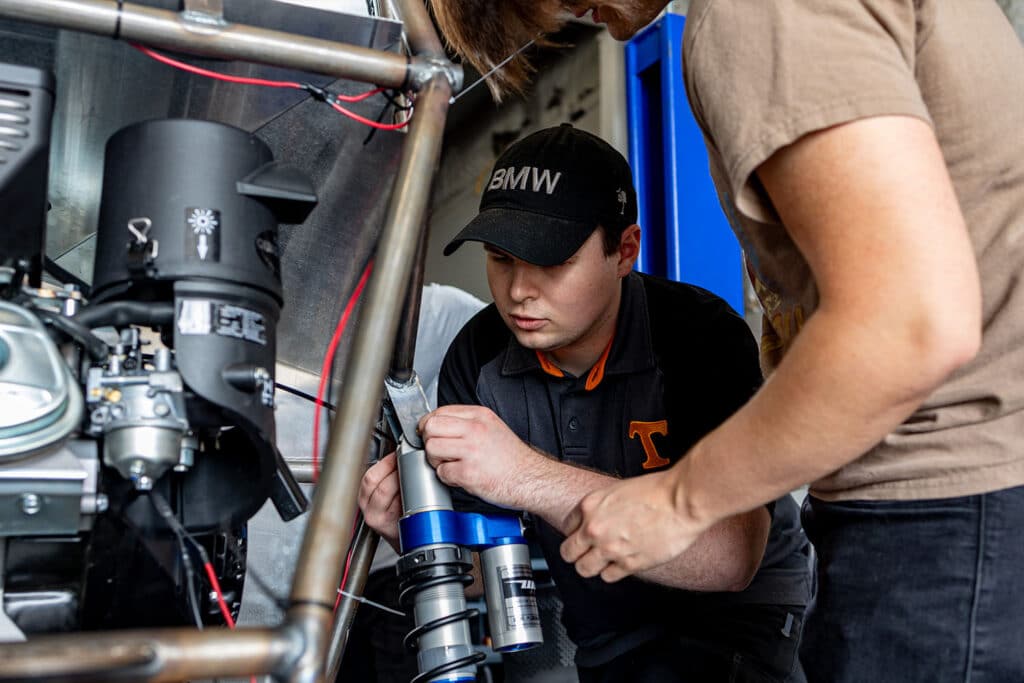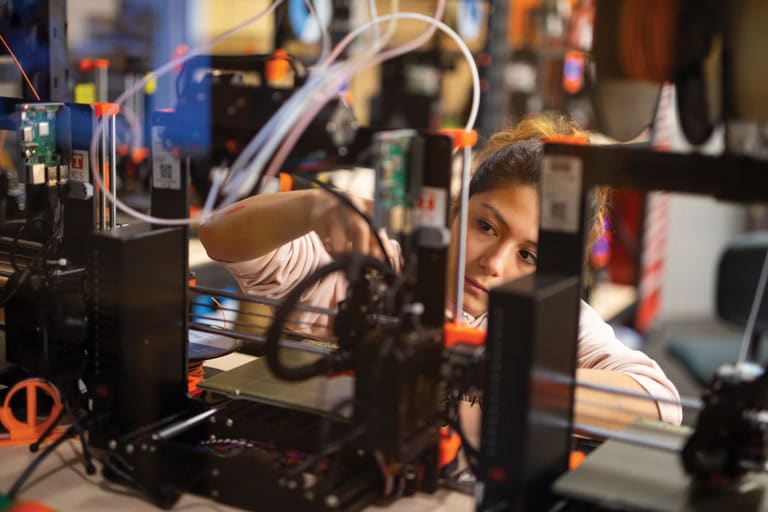
Mechanical Engineering, BS
Mechanical engineers are the brains behind the design, analysis, testing, and manufacturing of some of the world’s most complex systems that govern our daily lives. From vehicle design to power plant maintenance––whatever path you choose, your future in mechanical engineering begins here.
Program overview
One of UT’s largest engineering programs, the mechanical engineering program combines interdisciplinary study with hands-on research and career readiness for a robust undergrad experience. Through connections with industry partners and access to world class research labs and centers, students will participate in experiential learning, gaining in-depth knowledge from industry leaders and world-renowned faculty.
In addition to mechanical engineering courses, our department also hosts biomedical and aerospace engineering programs, allowing students from each of the three distinct disciplines to network and conduct interdisciplinary projects and research together.
Why Study Mechanical Engineering?
Obtaining a bachelor’s degree in mechanical engineering opens the door to a versatile field that plays a crucial role in a wide variety of industries, providing career opportunities and research catalysts for those interested in making positive social, economic, and environmental impacts.
Industry Connections
The mechanical engineering BS program at UT provides practical research and application through world class labs and centers as well as collaborative work with industry partners like ORNL, the Manufacturing Demonstration Facility, the US Department of Energy, General Motors, and more.
Career Readiness
Internships and co-ops allow students to gain experiential work in areas like automotive and advanced manufacturing, robotics, and energy storage for global organizations, so you can gain professional experience and create industry connections for a better future in mechanical engineering.
Career Outlook
According to payscale.com, early career pay for biomedical engineers starts at a median salary of $79,600, with employment from a wide variety of industries.
What can you do with a BS in Mechanical Engineering after graduation?
Mechanical engineers work on everything from small devices like sensors and microchips to large systems like spacecraft and industrial machinery. They can pursue careers in the automotive industry, aerospace and defense, the energy sector, consumer goods, and more. A day in the life of a mechanical engineer could look like studying mechanics of the human body, developing technologies to improve energy efficiencies, or improving manufacturing processes.
UT Alumni
When you get a BS in mechanical engineering from UT, you’re following in the footsteps of the Engineering Vols before you. Our alumni have gone on to be employed by NASA, DENSO Corporation, the National Institute of Standards and Technology, ExxonMobil, Nissan, and more. With a degree in mechanical engineering, the possibilities are endless.
Featured Courses
Mechanical engineering involves the design, analysis, testing, and manufacture of mechanical and thermal systems. Mechanical engineers are employed in nearly every industry, from basic research through mass production of energy systems, computer software/hardware, robotics, and vehicles of all kinds. The mechanical engineering curriculum includes mechanical design, solid and fluid mechanics, thermodynamics, heat transfer, vibrations, manufacturing processes, instrumentation and automatic control. Visit the course catalog for more information about our curriculum.
ME 231 Dynamics
Kinematics of rigid bodies, center of mass, and kinetics of systems of particles. Mass moments of inertia. Kinetics of rigid bodies. Newton’s laws, work-energy, and impulse-momentum.
ME 321 Mechanics of Materials
Concepts of stress and strain; stress-strain relations; applications including axially loaded members, torsion of circular shafts, and bending of beams.
ME 463 Mechanical Vibration
Free and forced response of systems with multiple degrees of freedom. Response to arbitrary excitation. Lagrange’s equations. Introduction to continuous systems. Vibration absorbers and rotor balancing.
ME 460 Mechanical Engineering Design II
Synthesis and design of a complete mechanical engineering system. Participation in team design effort, including formal oral presentations and written design report.
Complementary minors
Interested in pursuing a minor to expand your engineering expertise? See below for minors that would pair well with mechanical engineering:
Admissions and Aid
Choosing the right university to pursue an engineering degree is an important decision—and a significant investment. We want to make sure that you have the information you need to both apply and make attending UT affordable.


Ready to Join Us?
See yourself on Rocky Top? We’ve made it easier than ever to apply for admission. Learn more about our admission requirements and the steps to apply to be an Engineering Vol.
